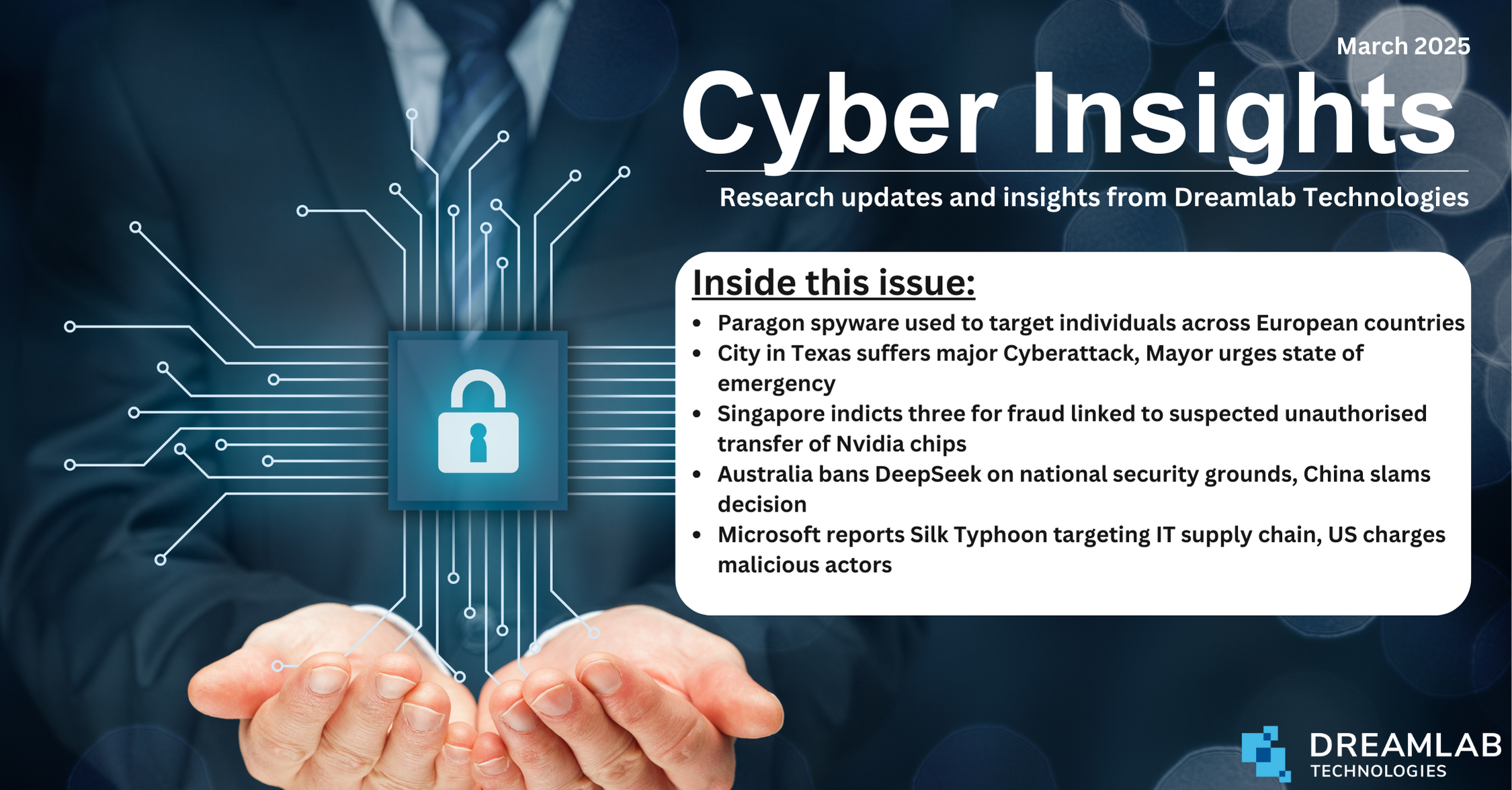
Dreamlab Technologies presents to you our brand new вАШCyber InsightsвАЩ newsletter вАУ an expert analysis of the latest developments in the cyber domain across the globe. The cyber world is a world full of opportunities, but unfortunately faces new and emerging threats every day. This newsletter contains insights and trends in cyber security and emerging technologies that will help you stay informed regarding the threats and challenges in today’s rapidly evolving digital world. It also comes with a brief analysis of the cyber security events from a geo-political perspective. In the evolving geo-political dynamics today, cyber-security is increasingly being prioritised by countries worldwide. Stronger cyber defence capabilities, higher investments in cyber security budgets and facilitating cyber policy dialogues are some of the new trends observed in the global geo-politics. The concise content in this paper provides a glimpse into this global scenario concerning the cyberspace. It is easy to read and can help promote awareness regarding best cyber security practices and safeguard our digital lives.
Inside this issue:
- Paragon spyware used to target individuals across European countries
- City in Texas suffers major Cyberattack, Mayor urges state of emergency
- Singapore indicts three for fraud linked to suspected unauthorised transfer of Nvidia chips
- Australia bans DeepSeek on national security grounds, China slams decision
- Microsoft reports Silk Typhoon targeting IT supply chain, US charges malicious actors
In this edition, we dive into a widespread hacking campaign using spyware built by an Israeli firm, that targeted individuals across European countries. The campaign, uncovered by Whatsapp, allegedly targeted journalists, human rights defenders, and activists in Italy and other nations like Denmark, Germany, the Netherlands and many more. The incident highlights the growing use of spyware, raising serious concerns regarding privacy, security, and the abuse of power as it is often deployed to monitor communications, disrupt investigations and silence dissent. We dive further into the investigation by ItalyвАЩs National Cybersecurity Agency (ACN) and WhatsApp to learn about the hack, the attack vector and the exploit strategy.
Next, we take a look at the major cyberattack that took place in the city of Mission, Texas, in the US, that compromised the cityвАЩs entire network and data systems, urging a declaration of a state of emergency. The cyberattack caused the cityвАЩs server and back up servers to be encrypted by ransomware, potentially risking exposure of sensitive personal information across departments, thus, forcing systems offline. Multiple cities in Texas have persistently been targeted over the past years with cyberattacks, urging immediate attention from the government. We study the cybersecurity measures taken by the government in this regard.
Spanning Asia, we come across an investigation by Singaporean authorities that charged three individuals including a Chinese national, with fraud linked to the suspected transfer of Nvidia’s AI chips to the Chinese AI firm DeepSeek, which are prohibited for export to China by regulations. The charged individuals were suspected of transferring US-manufactured servers likely containing restricted AI chips to falsely represented destinations, thus, violating trade restrictions. Singapore has pledged to consistently enforce export control laws and prevent illicit activities. The case highlights growing concerns over the control and export of advanced technologies like AI, to prevent illicit activities that can threaten national security, and reflects the broader geopolitical tensions surrounding innovation rivalry, particularly between the U.S. and China.
Across Oceania, we delve into the Australian governmentвАЩs decision of banning DeepSeek, the Chinese AI chatbot, on government devices due to national security concerns and ChinaвАЩs response to the ban, by accusing Australia of politicising trade and technology issues. The ban follows similar actions by Italy and Texas, with growing international concerns about the app’s alleged privacy risks, according to reports. The Australian government has urged citizens to be cautious about their online privacy and review privacy policies carefully. The incident yet again highlights the complex intersection of technology, national security, and geopolitical relations with respect to rapidly advancing technologies like artificial intelligence (AI).
And in Big Tech, Microsoft warns against the evolving attack tactics of вАШSilk TyphoonвАЩ, the Chinese cyber-espionage group, which is now targeting IT supply chain chains through remote management tools and cloud services. We examine the attack tactics and see how the U.S. authorities have charged 12 Chinese nationals linked to hacking operations, including seizure of internet domains linked to the same group. Microsoft has advised organisations to update their security tools with the latest patches to prevent cyberattacks, as the cybercriminal group continues to evolve its strategies.


